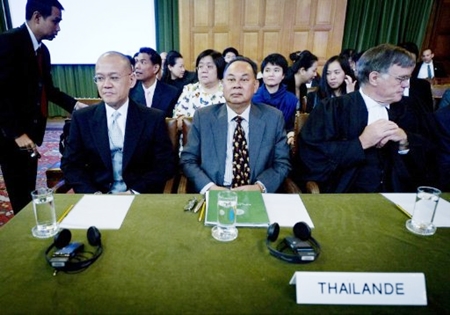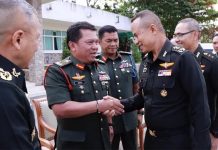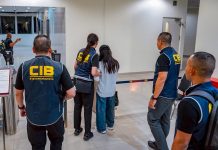BANGKOK, July 18 — Thai Minister of Foreign Affairs Kasit Piromya said Monday he was satisfied with the International Court of Justice (ICJ) or World Court rulings as they apply to both Thailand and Cambodia, requiring that both countries withdraw troops from the disputed border area near Preah Vihear Temple.
Present at the ICJ, the highest UN court, in The Hague, the Netherlands to hear the World Court decision on the Cambodian border issues, he told a Bangkok-based media via teleconference that the provisional measures did not focus on one side but applied to both countries.

The Thai minister said that Thailand had demanded the Cambodia to withdraw its troops from Preah Vihear and hold bilateral talks under the existing cooperation frameworks. Mr Kasit said the court’s order took a direction similar to Bangkok’s stance.
“This is not who will get more benefit from the ruling, but Thailand has always wanted talks between both sides to find a joint solution,” he said.
Prime Minister Abhisit Vejjajiva has been informed about the rulings, said Mr Kasit, adding that the premier would meet with Defence Minister Gen Prawit Wongsuwan regarding the Thai- Cambodian General Border Committee (GBC) meeting.
French news agency Agence-France-Presse (AFP) reported Monday that the UN court ordered both Thailand and Cambodia to immediately withdraw their troops from the disputed area around Preah Vihear temple following the complaint by Phnom Penh filed in April seeking provisional measures on the withdrawal of Thai troops and the ban on Thai military activities from the area.
The court turned down Cambodia’s demand for a unilateral Thai pullback, and Thailand’s demand for Cambodia’s request to be removed from the court’s consideration was unanimously rejected.
Cambodia asked the court to clarify and interpret its ruling on Preah Vihear temple in 1962, in which the court ruled the ancient Hindu temple belonged to Cambodia but did not define the boundaries in the area surrounding the structure.
“Both parties must immediately withdraw their military personnel now present in the provisional demilitarised zone and refrain from any military presence within that zone,” AFP quoted World Court President Judge Hisashi Owada who read the order at The Hague.
The court ordered Thailand and Cambodia to withdraw their troops from the newly defined demilitarised zone in a disputed portion of their border around the ancient temple.
“…there is an urgent need for the presence of all armed forces to be temporarily excluded from the provisional demilitarised zone around the area of the temple,” the judge said.
The French news agency reported that the ICJ also ordered Thailand not to obstruct Cambodia’s free access to the Preah Vihear complex or prevent Cambodia from taking fresh supplies to its non-military personnel there, while urging both countries to work with the Association of Southeast Asian Nations (ASEAN) to reach an agreement to allow the regional bloc’s observers to enter the disputed zone.
The two countries were also ordered to revive their stalled talks to resolve the conflicts.
Both sides must report development to the court until a decision on Cambodia’s main request for interpretation of the 1962 order is finalized, which is expected to take the court several months.
Meanwhile, Thai Defence Minister Gen Prawit Wongsuwan commented after the ICJ read its decision that the army must discuss the matter with the foreign ministry first and is ready to follow its guidances.
When asked whether he will discuss the ruling with his Cambodian counterpart, Gen Prawit said he is ready to hold talks if asked by Cambodia.
“But I understand that Cambodia may wait after the new Thai government is formed,” said Gen Prawit.
Army Region 2 commander Lt Gen Thawatchai Samutsakorn, who oversees the disputed border area, said troop withdrawal could not be done in the next few days as there are various levels of working steps.
Gen Thawatchai explained that a troop withdrawal cannot proceed immediately as it will take time for both Thailand and Cambodia.
“For Thailand, we must also wait for the formation of the new government and its direction regarding the case”, the commander said, noting that any command is ordered step by step from the government to the army chief, who then instructs the operational level.
Following reports on the latest mobilisation of heavy arms by Cambodian troops near the Thai border, Gen Thawatchai urged the Thai public not to worry about the matter as it was normal practice of Cambodian troops and the army is always on alert to protect the kingdom’s sovereignty.




